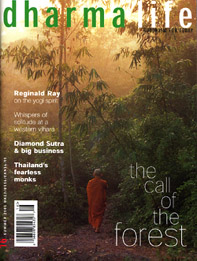Urgent Redress
The earthquake in Gujarat, India, last January was by far the worst to have affected India for many years. The death toll is estimated at 30,000, many towns and villages were devastated, and millions of people have been uprooted. Taiwanese Buddhists, who have been generous benefactors of our Buddhist and development projects in Maharashtra and elsewhere, heard reports of the disaster and offered us money for relief work. People from our Buddhist movement, TBMSG, had already considered making a response, but we had been thinking of long-term rehabilitation work rather than emergency aid. We have experience of running rehabilitation projects, such as the three educational hostels we had set up in the wake of the 1993 earthquake in Maharashtra. Many children who had been made homeless and perhaps orphaned by the disaster have benefited from these; but involvement in relief work in the wake of a disaster was a new departure for us. Our Taiwanese friends wanted to help and, while they did not feel confident in the effectiveness of making donations to the Indian government, they had faith that TBMSG would ensure aid reached its target.
We contacted various bodies for advice on the best use of our resources. We knew that money and supplies were going into the affected area, but what extra help was needed, and were there people whom the aid was passing by? We were particularly concerned about the Gujarati Dalits (or ex-Untouchables) with whom we felt a strong fraternal connection, and the Moslems, who also tend to be sidelined most of the time in India. Moreover, the affected part of Gujarat is a very conservative and caste-ridden area.
There were different reports in the press on what was required. One organisation, with an excellent reputation for working with the poorest women, told us that durries (small carpets for sleeping on) and water containers were most vital. Others told us food, tents and blankets were a priority.
The Maharashtran government provided us with trucks to transport the goods to the devastated areas, and our team travelled north. They visited villages at or near the centre of the earthquake, and discovered that many locals seemed not to have received help with their most basic needs. Some Dalits and Moslems in these places said that our team was the first to bring them crucial supplies, even water. There is little doubt that caste discrimination affected the relief work.
According to Bodhidharma, head of our team and first on the scene, 'Civil life in Bhuj (the town at the epicentre) was shattered. People were struggling to find tents, water and basic foods. One Moslem locality that we visited had been totally destroyed. Women were given two pots of water from a water tank. It was only the third time they'd had water in the 11 days since the earthquake struck, and the water was greenish and evidently dirty. No government officials or local leaders had visited: apparently we were the first group to arrive. In a Bhangi (sweeper) locality we saw people living in a pathetic state - surrounded by pigs, filthy public toilets and a terrible stench.
'Further on we found a community of Dr Ambedkar's followers, camping in a shelter made of sarees and dhotis. One old man had lost his wife; one woman had been trapped and her leg broken while she tried - and failed - to save her two daughters; another man was unable to walk. Again we were their first relief visitors. The story we heard over and over was that the help was going to the high castes. We arranged tankers to provide water to these three localities from the next day, and this continued until the Bhuj water supply was restored.'
When I arrived two weeks after the earthquake Bhuj was a picture of desolation. Blocks of flats had collapsed and most of the poorer houses were little more than piles of stone. When we arrived we were immediately handed pollution masks to protect us against the stench of rotting flesh. Fortunately we only needed them occasionally.
Most people seemed dazed and unable to take much initiative. We visited Ratlam, a devastated village 15 km from Bhuj, where locals had received almost no help. Yet there seemed to be so much money coming into the Government, and so many non-governmental organisations working there. It was chaos.
Our team also reached many interior villages, and took aid to nomadic tribes.
As word of our relief work spread, we received many pleas for help from many areas. First we sent a survey team that identified needy families, and as soon as possible aid followed. We focused on supplying water, tents and household kits comprising the bare essentials needed for survival. By the end of our operation we had erected over 1,000 family tents and distributed 1,500 household kits.
We have now moved on to a new phase of relief work in which we are concentrating on long-term rehabilitation. We have some contributions from Taiwan, and the Karuna Trust is raising money from the UK. We are setting up two educational hostels (one for boys and one for girls affected by the earthquake) which will each be able to support 60 to 80 children. Finally, we have established a meditation and Dharma centre to provide psychological and spiritual help to the Buddhists who have been affected.
Our relief team lived in difficult conditions but we made a significant contribution with help from Taiwan, the dedication of a few ordained Buddhists, and the involvement of many volunteers. The neglect we saw and the inequity of the aid provision pointed to a pressing need. A major natural disaster hits India at least every two years, and minor ones (which would be considered major in smaller countries) happen much more often. Our experience in Gujarat suggests that our contacts enable us to help the poor and minority groups who are often marginalised during crises.



